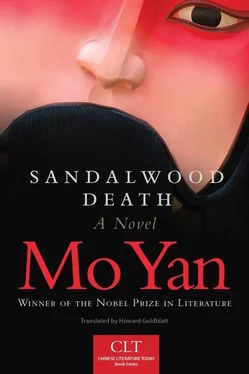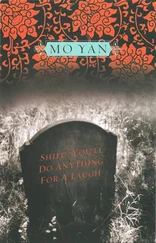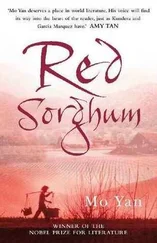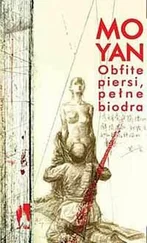Son, I am using the time before Eminence Qian’s palanquin arrives to fill you in on family affairs. I was afraid that if I did not say this to you today, there might not be another chance.
Your grandfather contracted cholera when I, your dieh, was ten years old. The sickness took hold in the morning, and by noon he was dead. Every family in Gaomi County lost someone to the disease that year, and no house was spared the sound of wailing. People were too busy burying their own to give thought to their neighbors’ troubles. Your grandmother and I—I know this sounds terrible—dragged your grandfather like a dead dog over to the nearest potter’s field and buried him in a makeshift grave. We had no sooner turned to head back home than a pack of wild dogs ran over and dug him up out of the ground. I picked up a piece of broken brick and went after those dogs with carnage on my mind. But they just glared at me through bloodshot eyes, baring their fangs and baying. They feasted on the dead until their whiskers were slick with grease, their bodies sleek and powerful. Fierce as a pack of little tigers, they were a fearful enemy. Your grandmother pulled me away.
“Your grandfather isn’t the only one, boy,” she said, “so let them go ahead and eat.”
Knowing that I had no chance to ward off those crazed dogs, I backed off and watched as they tore the clothes off your grandfather and sank their fangs into his body. They went first to the internal organs and finished by gnawing at his bones.
Five years later, typhoid fever came to Gaomi County and carried off your grandmother, who, like her husband, fell ill in the morning and was dead by noon. But this time I dragged the corpse over to a haystack and cremated it. Now I was on my own, all alone. All day long I roamed the land with a stick in one hand and a wooden ladle in the other, begging for food. At night I slept anywhere I could, staying warm in a haystack or by the lingering heat from a stove frame. Back then, there were lots of young beggars like me, and that made survival especially hard. On some days I knocked on hundreds of doors without getting even the scrapings of a sweet potato for my effort. I was on the verge of starvation when I recalled something your grandmother had told me about a cousin who lived and worked in a yamen in the capital. Life was so good for him, he often sent gifts of silver back home. I decided on the spot what to do. Off to the capital.
I survived the trip by begging or doing occasional odd jobs for people. And so it went, breaking up the journey by staying in a place long enough to earn a little travel money, my progress slow but steady—hungry one day, full the next—until I reached my destination. Joining a bunch of liquor traders, I entered Peking through Chongwen Gate. I vaguely recalled your grandmother’s telling me that her cousin worked at the Board of Punishments; by asking along the way, I made it to the Six Boards District, where I walked up to one of the two hard-looking soldier-types who guarded the Board of Punishments gate and was sent flying by the back of his sword. A setback, to be sure, but not nearly enough for me to abandon my plan, not after traveling all that distance. All I could do was hang around the Board, pacing back and forth until my luck changed. The street was fronted by restaurants with fancy entrances, places with names like “Where Immortals Gather” and “The Inn of Sages,” all bustling with hungry customers whose carriages and other conveyances interrupted the flow of traffic. The air was heavy with the smells of cooked meat, fish, and poultry. The street was also home to nameless food stands where stuffed buns, wheat cakes, flatbreads, bean curd, and other treats were sold… who could have guessed that there could be so many good things to eat in Peking? No wonder people flocked to the city. I’ve been a survivor all my life, and have enviable judgment. I do not let opportunities pass me by. I did odd jobs for the restaurants, working for leftovers, and since Peking was so big, begging was easier than here in Gaomi. Rich diners would order a table filled with meat or fish or poultry, take a few bites, and leave the rest, which made it possible for me to keep my belly full without spending anything. Then, after filling up with someone’s leftovers, I’d find a quiet spot out of the elements and sleep. In the warmth of the sun’s rays, I heard my skeleton creak and pop as it grew bigger and stronger. By my second year in Peking, I was a head taller than when I’d arrived. I was like a thirsty rice shoot after a spring rain.
But then, just when I had settled into a carefree life with plenty of food, a gang of beggars attacked me and beat me half to death. The leader, a scary-looking one-eyed man with a knife scar on his cheek, fixed his good eye on me and said:
“You little bastard, what rock did you crawl out from under? Who said you could fill your belly with food in my territory? If I ever see you around here again, I’ll break your dog legs and gouge out your dog eyes!”
Sometime in the middle of the night, I crawled out of a foul-smelling ditch and curled up beside a wall, hurting all over, shivering, and hungry. I thought I was going to die. But then, through a haze, I saw your grandmother standing in front of me.
“Don’t let this get you down, son,” she said. “You are about to enjoy a stroke of good luck.”
My eyes snapped open—there was nothing there but the autumn wind making the tips of tree branches moan, nothing but the last chirps of some half-dead crickets in the rotting weeds, that and a sky full of winking stars. But when I closed my eyes again, your grandmother was still there, telling me that my luck was about to change. I opened my eyes, and she was gone. Early the next morning, the sun rose round and red in the eastern sky, making the dew on dead grass shimmer beautifully. A flock of crows flew by, trailing caws behind them on their way to the south side of the city, for what reason I could not say. I would later learn the reason. I was so hungry I could barely stand, and I contemplated going over to beg for something to eat from one of the food stands. What held me back was the fear that I would run into that one-eyed beggar dragon. But then I spotted a piece of cabbage in a little pile of charcoal. I ran over, grabbed it, and carried it back to my spot beside the wall, where I took big crunching bites, just as mounted soldiers in gray uniforms with red borders and hats with red tassels emerged from the Board of Punishments and broke into a trot down the street, newly smoothed over with yellow earth. They had swords on their hips and whips in their hands. Every human who got in their way tasted the whips, as did the dogs. The street was swept clean of obstacles in no time. A few moments later, a prison van rolled out through the gate, pulled by a scrawny mule whose protruding backbone was as sharp as a knife and whose legs looked like spindles. I could not make out the features of the shaggy-haired prisoner standing in the caged wagon, whose ungreased axles creaked as it rolled along, swaying from side to side. The way ahead was led by the horsemen, who had ridden up and back earlier and were followed by a dozen or so men blowing horns, making a noise that could have been mistaken for weeping cattle. A clutch of officials on horseback came next, all in fancy court attire. In the middle was a rotund man with a thin moustache that looked as if it were pasted on. Another ten or fifteen mounted soldiers brought up the rear. Two men in black, with sashes around their waists and red caps on their heads, walked alongside the prison van, each holding a broadsword. They appeared to have ruddy complexions—at the time, I was not aware that they had smeared rooster blood on their faces. They had a spring in their steps, but their footfalls made no noise. I could not take my eyes off them. Fascinated by their impressive bearing, I wondered if I would ever get a chance to learn how to walk that way, like a big black cat. All of a sudden, I heard your grandmother say from behind me:
Читать дальше












